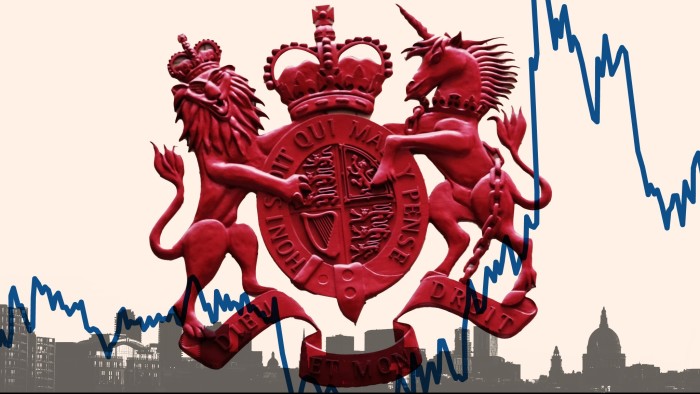This week’s sell-off in UK gilts, sparked by a tearful Rachel Reeves in the House of Commons, showed how fragile investor confidence is in Britain’s precarious fiscal position.
The merest suggestion that the chancellor may leave her job, caused by Sir Keir Starmer’s initial failure to fully back her on Wednesday, was enough to spook holders of the government’s debt — and force the prime minister to cling even more tightly to Reeves’ fiscal rules.
Reeves has vowed to balance the government’s books by the end of the parliament, but there is rising market concern that Labour MPs are less wedded to the need for financial discipline, and that any other occupant of 11 Downing Street would be likely to water down the commitments.
Although gilt prices rallied on Thursday, investors said Wednesday’s sell-off was a “dry run” in case the chancellor eventually departs — while economists warned of a “perfect storm” that could lead to a tax-raising budget of a similar scale to last October’s.
“All bond markets are sensitive to uncertainty regarding the fiscal stance, but perhaps the UK is the most sensitive developed market,” said Fredrik Repton, a senior fixed income portfolio manager at US fund house Neuberger Berman.
“The gilt market is largely concerned that a new chancellor would rip up Reeves’ fiscal rules and go for excessive unfunded borrowing,” added Craig Inches, head of rates and cash at Royal London Asset Management.
Reeves appeared much more buoyant on Thursday, as she joined Starmer to launch NHS reform, embracing the prime minister beforehand. “Clearly I was upset yesterday, and everyone could see that,” she said afterwards. “It was a personal issue and I am not going to go into the details of that.”
Starmer’s initial reluctance to offer a full-throated backing of his chancellor came hours after the government’s decision to gut its welfare reforms, which had been intended to save £5bn, in a sign of how hard the Labour government will find it to persuade its backbench MPs to make the savings it needs to meet its fiscal rules.
The prime minister’s comments sent 10-year gilt yields spiking as much as 0.23 percentage points to a high of 4.68 per cent on Wednesday. They fell on Thursday back to 4.55 per cent, after Starmer offered reassurance that Reeves would be chancellor for “a very long time to come”.
Yet his clarification was only the latest U-turn for a government that has been forced to make reversals by its MPs, and now by the markets.
“I think it’s been the worst week for Labour governments for a long time,” said Ed Balls, former shadow chancellor, on his weekly podcast on Thursday.
But Reeves’ team believe she has been politically strengthened by the market reaction to rumours of her departure. “They believe she’s now the safest she has been since last summer,” said one Labour aide.
One senior figure close to Starmer said there was no imminent reshuffle of ministers or shake-up inside Number 10.
With Downing Street providing no further detail on the nature of the “personal” issue that drove the chancellor to tears, speculation has swirled around Westminster.
After a bruising weekend trying to bring round Labour MPs to the welfare cuts, the chancellor had an altercation with Speaker Sir Lindsay Hoyle just minutes before the weekly Commons joust on Wednesday, people familiar with the interaction said.
One ally of Reeves said it had been a “horrible” week for senior figures in the Labour government. “Rachel is only human and she felt everything getting on top of her, the Lindsay Hoyle thing was the straw that broke the camel’s back, Rachel is quite an emotional person, she does have feelings.”
This rare demonstration of emotion was in contrast to the stern image Reeves has shown to the markets. She overhauled the fiscal rules on taking office, pledging to push the current budget into surplus by 2029-30.
The perception that the Labour party was being driven into harsh reforms in order to generate savings to meet Reeves’ budget targets was one of the factors that undermined the welfare package among backbenchers this week.
“The markets are concerned that if the chancellor goes, such fiscal discipline would follow her out of the door,” said Andrew Wishart, an economist at Berenberg bank.
Other investors said it was concerns over the broader stability of the public finances that had unsettled the market rather than a desire to keep Reeves in post. Some said they did not think Reeves would remain in the job.
“It would be surprising if she can credibly stay until the autumn Budget,” said Vincent Mortier, CIO at Europe’s biggest asset manager, Amundi.
The UK “will probably need a new chancellor who can reset economic policy, which has to address a bigger fiscal hole”, Mortier added, a hole that will be made bigger if official growth forecasts are downgraded.
As it is, expectations are now widespread that the chancellor will have to raise taxes in the autumn Budget.
“You can imagine a scenario where the government gets unlucky on multiple fronts and faces a perfect storm in fiscal terms,” said Ben Zaranko of the Institute for Fiscal Studies.
This could leave them facing potential tax rises on a scale that is “not dissimilar to the one-off tax rise they announced last year . . . easily running into many tens of billions of pounds”, he added.
Bond fund managers have grown increasingly wary about the position of the UK public finances after a series of moves to backtrack on policies intended to improve the deficit.
That has fuelled anxiety that the UK could be pushed into a deeper debt problem. Its 30-year borrowing costs hit their highest this century during the April bond market rout.
“The Starmer government has been struggling with a problem — they want to consolidate but they can’t find places to cut,” said Robert Tipp, head of global bonds at PGIM Fixed Income. “The instability hurts the gilt market.”
https://www.ft.com/content/a000f4d8-8032-42a0-8cc2-7105fbdd7c26


